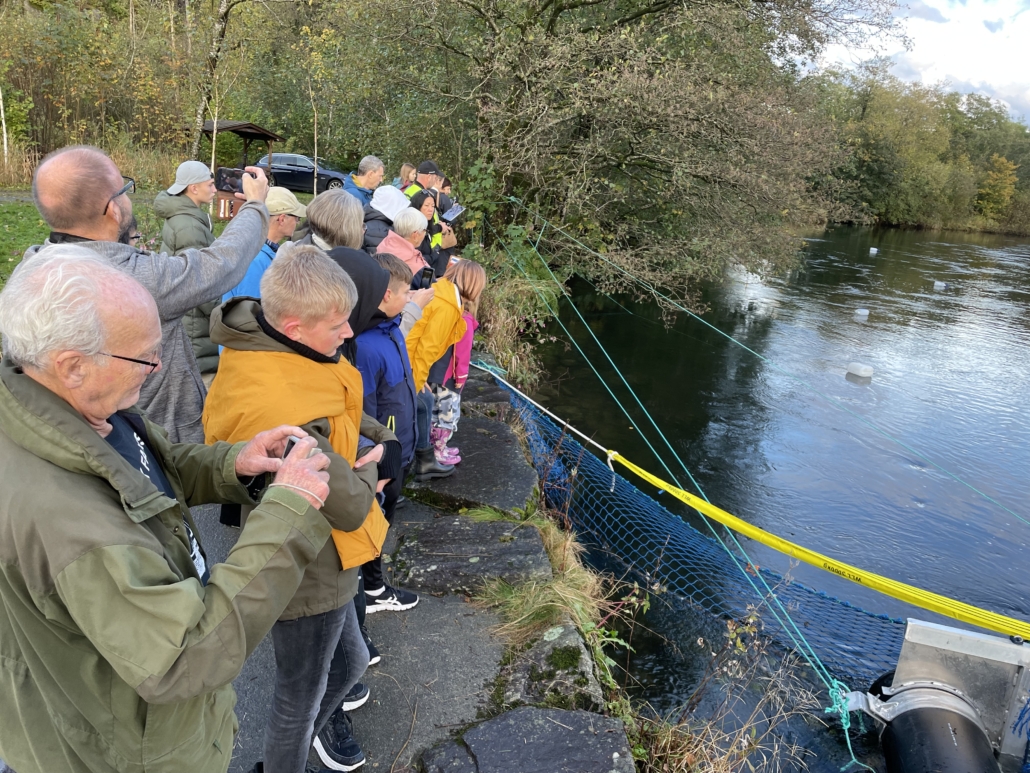The River Cleaner
Open source. No copyrights.
The River Cleaner opened in Etne!
A milestone for Rivers.Global, no doubt. Due to weather and other conditions we had to rush things a bit, but had a great opening ceremony in the Etne river on October 5. We threw 46 plastic items in the river, all of them were catched by The River Cleaner!
SINTEF Ocean in Trondheim has in March 2021 concluded that the sketches of The River Cleaner look fine. They advised us to have a down-scaled model built and tested before we build a pilot for a real river in Vietnam or the Philippines. This work has now resulted in the launching of the pilot on September 13, 2021 and tests and opening in the Etne river in early October. It floats just perfect, is extremely stable and can withstand heavy river streams.
Detailed technical specifications and complete drawings, with minor improvements wil be made in 3 different sizes. The plan is to have the first real prototype built in Vietnam or the Philippines in 2022.
As soon as The River Cleaner is proven effective, details on how to build and install it will be presented online for anyone to copy, free of charge. Authorities and organizations in South-America, Africa and Asia may copy and build their own river cleaners. Local ownership assures better sustainability. And less costly and polluting shipping across borders. In this way we can get real progress in the struggle for cleaner oceans.
Natural currents as power.
The River Cleaner uses the river’s current to guide plastics and other debris into a large net, which can easily and swiftly be lifted onto shore and emptied for sorting.
- The River Cleaner will be simple, produced of materials easily accessible anywhere in the world.
- The River Cleaner will be solid enough to endure monsoons and heavy currents.
- The River Cleaner will be efficient, with a scalable net that can hold lots of debris.
- The River Cleaner will be open source. Drawings, test results, adjustments and improvements will be made accessible for all, free of charge, without copy-rights.
The River Cleaner is located at the river bank, making it easy for a truck with a crane or a mechanical crane on the bank to lift it from the river when it’s full.
Some of the debris can be recycled, some of it can be used to produce new products (water hyacinths, abundant in rivers in South-East Asia, can become furniture and more), some of it ends in an incinerator, preferably with energy recovery.
The first River Cleaner will naturally be the most expensive. Once we have a prototype that is proven simple, solid and efficient, we can broaden the horizon to other regions and other countries.
Close co-operation with local Authorities and local partners.
We will always focus on a close relationship with the local people and the local Authorities before installing a River Cleaner. They have the necessary expertise on their own river. And as always, we will work to prevent the garbage from even ending up in the river, cf our four ways to a cleaner ocean.
What is needed for The River Cleaner to be effective?
- A river with lots of floating plastics.
- The river must have a steady stream towards the ocean, even in the dry season.
- The river-bank must be able to hold a truck and containers for sorting of the debris.
- Some sort of waste management must be in place.
A local partner will assure smooth co-operation between local Authorities, local waste-management company, the garage or wharf that will produce The River Cleaner, the transportation and anchoring of the device, the emptying and sorting processes.
Local Authorities need to document that they have an infrastructure connected to waste management that is OK. The debris collected by the River Cleaner must be handled properly.
Local Authorities is responsible for the maintenance of The River Cleaner. They also need to see to that The River Cleaner is emptied on a regular basis.
Local Authorities must partly contribute economicaly for the cost of producing and installing of The River Cleaner. This assures the local ownership and better maintenance of the River Cleaner.
Your contribution is welcome!
There is a chance now for you to be part of stopping the streams of plastics into our ocean. We hope to see The River Cleaner doing its job 24/7 in polluted rivers world-wide. By lauching the River Cleaner we are for the first time reaching out to people on a broad scale to ask for their support. In addition to private donors, we challenge colleges, companies, foundations, communities, shipping companies and more to join us in the battle for a cleaner ocean. With your help we can prevent tons of plastics from reaching the ocean. Your contribution is highly appreciated. The Board will work hard to have the River Cleaner make a difference in polluted rivers around the globe.








